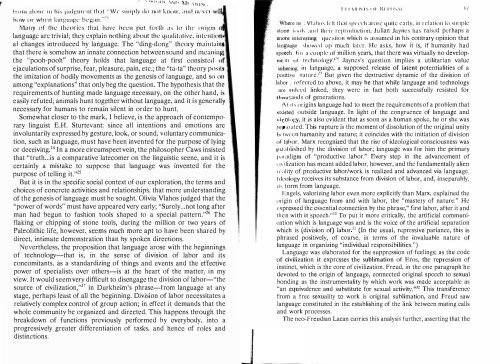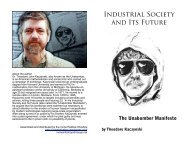CONTENTS - ouroboros ponderosa
CONTENTS - ouroboros ponderosa
CONTENTS - ouroboros ponderosa
You also want an ePaper? Increase the reach of your titles
YUMPU automatically turns print PDFs into web optimized ePapers that Google loves.
. •<br />
'''lloJl\J \NI ' 1\., \ N j,'\J( .<br />
IItllll ;dpllr III hi .... pU1rllH'lll ll!;tl "We .... ill1pl, d" Ihlt l.. II( 1W, "lid IIl'VeI<br />
Ih IW or whcn langtlagl' hegan. ".' !<br />
MallY "r the theories lilal have heell pul forlh as 1(1 Ihe migill<br />
language are trivial; they explain nothing about the 4ualil:llivc. inlenl<br />
al changes introduced by language. The "ding-dong" theory mailliai<br />
that there is somehow an innate connection between sound and meanil1111<br />
the "pooh-pooh" theory holds that language at first consisteu ot,<br />
ejaculations of surprise, fear, pleasure, pain, etc.; the "ta-ta" theory posit<br />
the imitation of bodily movements as the genesis of language, and so 011<br />
among "explanations" that only beg the question. The hypothesis that the<br />
requirements of hunting made language necessary, on the other hand, i<br />
easily refuted; animals hunt together without language, and it is generally<br />
necessary for humans to remain silent in order to hunt.<br />
Somewhat closer to the mark, I believe, is the approach of contempo<br />
rary linguist E.H. Sturtevant: since all intentions and emotions arc<br />
involuntarily expressed by gesture , look, or sound, voluntary communica<br />
tion, such as language, must have been invented for the purpose of lying<br />
or deceiving.2' In a more circumspect vein, the philosopher Caws insisted<br />
that "truth .. ,is a comparative latecomer on the linguistic scene, and it is<br />
certainly a mistake to suppose that language was invented for the<br />
purpose of telling it."25<br />
But it is in the specific social context of our cxploration, the terms and<br />
choices of concrcte activities and relationships, that more understanding<br />
of the genesis of language must be sought. Olivia Vlahos judged that the<br />
"power of words" must have appeared very early; "Surely ... not long after<br />
man had begun to fashion tools shaped to a special pattern., , 26 The<br />
flaking or chipping of stone tools, during the million or two years of<br />
Paleolithic life, however, seems much more apt to have been shared by<br />
direct, intimate demonstration than hy spoken directions.<br />
Nevertheless, the proposition that language arose with the beginnings<br />
of technology-that is, in the sense of division of labor and its<br />
concomitants, as a standardizing of things and events and the effective<br />
power of specialists over others-is at the heart of the matter, in my<br />
view. 1t would seem very difficult to disengage the division of labor-"the<br />
source of civilization,"" in Durkheim's phrase-from language at any<br />
stage, perhaps least of all the beginning. Division of labor necessitates a<br />
relatively complex control of group action; in effcct it demands that the<br />
whole community be organized and directed. This happens through the<br />
breakdown of functions previously performed by everybody, into a<br />
progressively greater differentiation of tasks, and hence of roles and<br />
distinctions.<br />
" I<br />
l · rvll·N I :-' Ill· I{ I · ... I,\J<br />
Where as , Vlall{)s kit 111;11 SI H"t'l'li arose quill; early, ill reiatioll lu silllple<br />
stone li ltll" ;IIHI IIll'ir reproduction, Julian Jaynts has raised perhaps a<br />
anore interesting qlll"-siioll which is asslImct.i in his contrary opinion that<br />
language showed lip much later. He aSKs, how it is, if humanity had<br />
speech h" " '" lllpic of million years, that there was virtually no develop<br />
II'. nl 01 lfehnology'!'< Jaynes's question implies a utilitarian valuc<br />
inhering. ill l"nguage, a supposed release of latent potentialities of a<br />
positive Ilature.::') But givt!n the destructive dynamic of the division of<br />
labor , rfcrrcd to above, it may be that while language and technology<br />
are ,,,deed linked, they were in fact both successfully resisted for<br />
-tllou'j;]lIds of generations.<br />
1\1 ilS urigins language had to meet the requirements of a problem that<br />
existed outside language. In light of the congruence of language and<br />
loIol,>gy, it is also evident that as soon as a human spoke, he or she was<br />
Jep;rraLcd. This rupture is the moment of dissolution of the original unity<br />
b,'lween humanity and nature; it coincides with the initiation of division<br />
of lohor. Marx recognized that the risc of idcological consciousness was<br />
f,,;rhlished by the division of labor; language was for him the primary<br />
I '.or adigm of "productive labor." Every step in the advancement of<br />
, "ilization has mcant added labor, however, and thc fundamentally alien<br />
,,.;rlity of productive labor/work is realized and advanced via language.<br />
Ideology receives its substance from division of labor, and, inseparably,<br />
lIS form from language.<br />
Engels, valorizing labor even more explicitly than Marx, explained the<br />
"rigin of language from and with labor, the "mastery of nature." He<br />
,,-,pressed the essential connection by the phrase," first labor, after it and<br />
Ihen with it speech."" To put it more critically, the artificial communi<br />
cation which is language was and is the voicc of the artificial separation<br />
which is (division (1) labor .'1 (In the usual, repressive parlance, this is<br />
phrased positively, of course, in terms of the invaluable nature of<br />
language in organizing "individual responsibilities.")<br />
Language was elaborated for the suppression of feelings; as the codc<br />
of civilization it exprcsses the sublimation of Eros, the repression of<br />
instinct, which is the core of civilization. Freud, in the one paragraph he<br />
devoted to the origin of language, connected original specch to sexual<br />
bonding as the instrumentality by which work was made acceptable as<br />
"an equivalence and substitute for sexual activity.'>32 This transference<br />
from a free sexuality to work is original sublimation, and Freud saw<br />
language constituted in the establishing of the link between mating calls<br />
and work processes.<br />
The nco-Freudian Laean carries this analysis further, asserting that the<br />
\/






